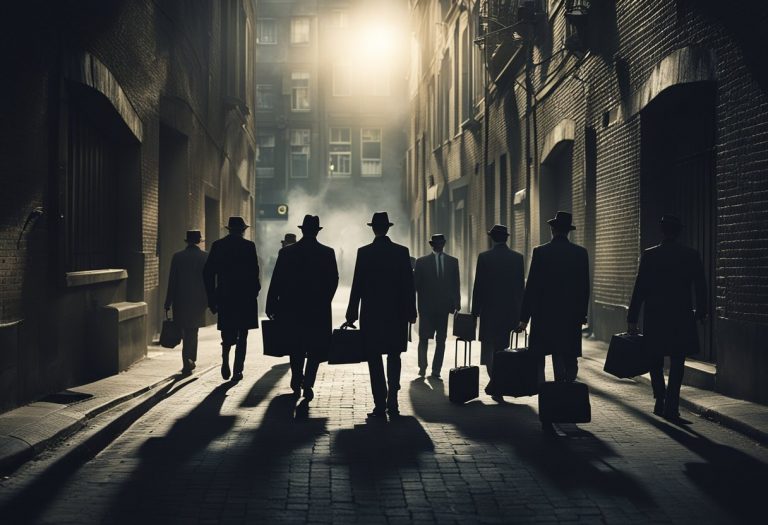The Colombo crime family stands as one of the notorious Italian American Mafia families that controls organized crime activities in New York City. It is part of the Five Families, which are central to the criminal landscape of the American Mafia. Originating in the late 1920s, with a history woven through the fabric of New York’s underworld, the family has been involved in a wide range of criminal enterprises, including racketeering, extortion, and loan sharking.
The youngest of the Five Families, the Colombo crime family has experienced its share of internal strife and law enforcement crackdowns over the years. Despite these challenges, the family has maintained a persistent presence in the city’s organized crime scene, often adapting its operations to circumvent law enforcement efforts. Their resilience and ability to endure through decades of legal pressures underscore the complexity and deep-rooted influence of the Mafia in the United States.
Story Stages
Historical Overview
The Colombo crime family, a pivotal component of the American Mafia known as La Cosa Nostra, has a rich history marked by intrigue and power struggles. From its inception to its position in the criminal world today, the family has played a significant role in the annals of organized crime in the United States.
Origins and Formation
The Colombo crime family was founded by Joseph Profaci in 1928, becoming one of the original Five Families of New York City. As part of La Cosa Nostra, the Colombo family established itself with a wide range of illegal activities, including extortion, loan-sharking, and illegal gambling, solidifying its power base in the criminal underworld.
Notable Events: Castellammarese War to Present
The Castellammarese War (1930-1931), a bloody power struggle for control of the New York mafia, indirectly set the stage for the family’s future. The conflict resulted in the creation of The Commission, a governing body for the mafia that included the Five Families.
In the 1960s, underboss Joe Gallo rebelled against the leadership of the Colombo family, an internal conflict that became part of the family’s storied past. This factional violence revealed the inherent volatility within the ranks of La Cosa Nostra.
The family’s namesake, Joseph Colombo, took over in the late 1960s and became known for public appearances, notably founding the Italian-American Civil Rights League, which aimed to fight the defamation of Italian-Americans. His tenure was cut short after being shot in 1971, which led to subsequent leadership changes and further internal strife.
Throughout the 1970s and beyond, the Colombo crime family continued to be a major force within Cosa Nostra, despite ongoing federal investigations and prosecutions that have sought to dismantle the organized crime network. The evolution of the family’s operations mirrors the transformation of organized crime as a response to legal and social pressures while maintaining a presence in traditional activities and racketeering.
Organizational Structure
The Colombo crime family, a formidable faction within New York City’s Mafia landscape, exhibits a complex structure with clear lines of authority and roles that are well-defined within its ranks.
Leadership Hierarchy
At the pinnacle of the Colombo crime family is the Boss, the ultimate authority and decision-maker. Traditionally, the Boss is supported by an Underboss, who acts as the second-in-command, and a Consigliere, a trusted advisor and mediator. This triad forms the family’s administration. Notable leaders, such as the family’s namesake Joseph Colombo, and more recently, Andrew “Mush” Russo, exemplify the pinnacle of power within the organization.
Capos and Crews
Below the administration are the Captains or Capos, each leading a crew of Soldiers and Associates. The captains report directly to the family’s administration and are tasked with overseeing various criminal activities. They are pivotal in maintaining the hierarchical structure of the family and act as intermediaries between the leadership and the lower ranks.
Respective Roles: Soldier to Consigliere
Soldiers, the backbone of the family, are made members sworn to follow the code of Omertà. Meanwhile, Associates are non-initiated individuals involved in the family’s operations. The rank of Soldier is a coveted position, denoting full membership and more direct involvement in the family’s enterprises. The Consigliere serves as the counselor and sounding board for the Boss, ensuring internal disputes are settled with discretion. This role has been exemplified by figures like Carmine Persico, whose counsel was integral to the family’s operations. The Federal Bureau of Investigation (FBI) continually monitors these roles and interactions within the family to combat organized crime.
Criminal Activities
The Colombo crime family, an Italian American Mafia entity, has historically engaged in a variety of illicit activities primarily centered around Brooklyn and Queens. These criminal endeavors include racketeering, extortion, drug trafficking, loan-sharking, and extensive involvement in legitimate businesses like labor unions to facilitate money laundering and fraud.
Key Operations and Schemes
Racketeering has been a cornerstone of the Colombo family’s operations. They’ve leveraged control over labor unions to demand tribute from businesses, engaging in systematic extortion to strengthen their financial backbone. The family’s historical infiltration into legitimate industries is also marked by schemes involving fraud and money laundering, functionality embedded deeply within the business landscapes of both Brooklyn and Queens.
Racketeering and Extortion
The Colombo’s racketeering activities are multifaceted, often revolving around the exploitation of labor unions to manipulate construction projects and other commercial enterprises within their geographical influence. Charges against family members have included extortionate tactics to secure control and cash flows from various businesses under the proverbial protection of the Mafia.
Drug Trafficking and Loan-Sharking
In the areas of drug trafficking, the Colombo family has reportedly had a hand in distributing narcotics throughout the regions of Brooklyn and Queens, bolstering their criminal portfolio. Additionally, loan-sharking provides a lucrative revenue stream, with the family offering predatory loans at exorbitant interest rates, fostering a cycle of dependency and coercion for borrowers.
Legal Confrontations
The Colombo crime family has faced numerous legal confrontations, leading to significant arrests and trials. Law enforcement agencies have been pivotal in these efforts, impacting the organizational continuity of the family.
Major Arrests and Trials
Prosecutors from the Eastern District of New York have secured multiple indictments against the Colombo crime family. In a notable case, leaders of the family pleaded guilty to charges that included racketeering, marking a significant victory for the Department of Justice. These guilty pleas in federal court have led to imprisonment and have been considered as a decapitation of the family’s leadership.
The Role of Law Enforcement Agencies
The Department of Justice, alongside Special Agents and detectives, have been relentless in their pursuit of the Colombo crime family. Their investigative work and coordination with federal entities have led to important arrests, showcasing the resilience of law enforcement against organized crime.
Impacts on Organizational Continuity
The incarceration of Colombo family members and the subsequent trials have disrupted the family’s activities and challenged their organizational continuity. The effectiveness of the prosecution efforts has put considerable pressure on the family’s ability to operate as it once did, leading to restructurings and power shifts within the organization.
Recent Developments

In recent times, the Colombo crime family has faced significant legal challenges, with numerous high-ranking members being charged and pleading guilty to various crimes.
Current Leadership Updates
Andrew Russo, the reputed boss of the Colombo crime family, has been a central figure in ongoing legal proceedings. His leadership is put to the test as he faces charges alongside other key members of the family.
In a related development, Benjamin Castellazzo, the underboss, and Ralph DiMatteo, the alleged consigliere, have also been under scrutiny. As legal pressures mount, leadership positions within the family are in a state of flux, with the potential for substantial changes to the hierarchy.
See Also:
Michael Franzese: The Transformation of a Mob Boss to Motivational Speaker
Investigations and Charges
The Federal Bureau of Investigation (FBI) has remained instrumental in uncovering a range of criminal activities associated with the Colombo family. Charges of money laundering conspiracy and other racketeering offenses have been brought against various members.
Among those charged are Vincent Ricciardo, Richard Ferrara, Michael Uvino, and Thomas Costa, reflecting a sweeping crackdown on the family’s activities. Moreover, Theodore Persico, Jr., a relative of the family’s long-time boss Carmine Persico, has been implicated in these investigations, showcasing a concerted effort to dismantle the family’s operations.
